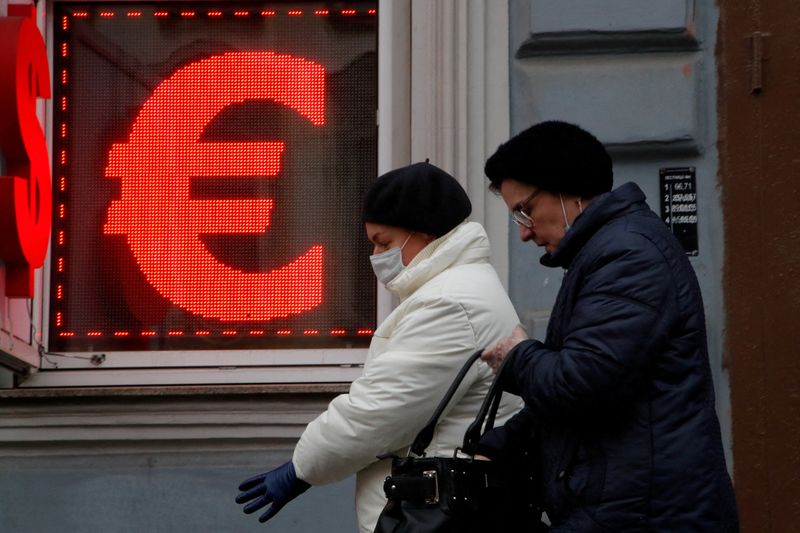 © Reuters. FILE PHOTO: Women walk past a board showing the U.S. dollar and euro signs in a street in Saint Petersburg, Russia February 25, 2022. REUTERS/Anton Vaganov
© Reuters. FILE PHOTO: Women walk past a board showing the U.S. dollar and euro signs in a street in Saint Petersburg, Russia February 25, 2022. REUTERS/Anton Vaganov
By Alun John
HONG KONG (Reuters) - The euro held most of its overnight gains on Thursday, having posted its steepest daily jump in nearly six years after a meeting between Ukraine's and Russia's foreign ministers and easing oil prices took some of the recent panic out of markets.
Traders now await a meeting of the European Central Bank later in the day for any signs of how Russia's invasion of Ukraine will affect monetary policy. U.S. inflation figures are also due, which could further guide expectations for the Federal Reserve's meeting next week.
The euro was trading at $1.1047 after jumping 1.6% on Wednesday, its best day since June 2016, along with gains in European stocks and a sell off in bonds.
The common currency had dropped to a 22-month low of $1.0804 earlier in the week, weighed down by the impact of Russia's invasion of Ukraine on European growth.
"A glance across market, in all things euro zone especially, could leave any casual observer forgiven for assuming that the war in Ukraine might have ended overnight. Not so, sadly," said NAB analysts in a morning note.
They attributed the euro's gains to some optimism ahead of a meeting between Russia and Ukraine's foreign ministers - the first meeting between the two since Russia invaded Ukraine two weeks ago - and reports that the European Union was discussing bond issuance to finance energy and defence spending.
Other factors NAB highlighted were "suspicions the ECB might not fully reverse its early February 'hawkish tilt' when it meets later today, given that inflation is destined to push still higher given the latest energy price shock."
Russia calls its actions in Ukraine a "special operation".
Elsewhere, sterling was steady at $1.3163 having jumped 0.65% overnight along with the euro, while the safe-haven yen was at 116.09 per dollar, its lowest in a month.
The dollar index was at 98.163, after tumbling 1.2% overnight amid the euro's surge, and hurt, along with the yen, by a rise in sentiment towards riskier assets like equities.
U.S. stocks rallied sharply overnight, as global oil prices posted their biggest plunge in nearly two years after the United Arab Emirates said it would support increasing output.
This also provided a boost to the risk sensitive Australian dollar, which was last at $0.7307 after jumping 0.7% on Wednesday.
The other main event due on Thursday is U.S. inflation data, a particular focus given the Fed meets next week and is widely expected to raise its benchmark overnight interest rate by a quarter of a percentage point.
Economists polled by Reuters forecast the U.S. consumer price index to have climbed 7.9% on a year-on-year basis in February, up from 7.5% in January, though this data will only show a preliminary impact from the surge in oil prices.

